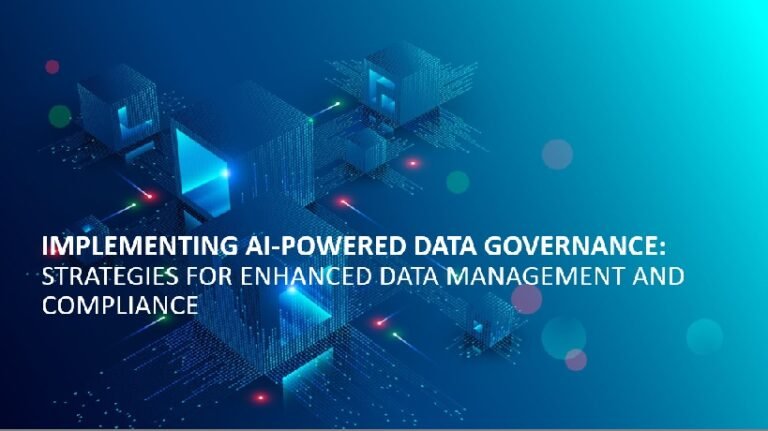What makes artificial intelligence (AI) so powerful for businesses today? How can companies ensure they are using this transformative technology to its full potential? One key way to unlock AI’s true capabilities is by implementing a robust data governance strategy. AI systems rely heavily on clean, well-managed information to produce accurate insights; without strong governance, these systems can falter.
To ensure businesses get the most out of AI services, it is vital to focus on enhancing the quality and management of information that feeds into these systems. This is where an effective governance framework comes into play. Enhancing AI capabilities through an effective data governance strategy is essential to unlocking its full potential, allowing businesses to thrive in a competitive environment.
Why Enhancing AI Services is Necessary
The Artificial intelligence solution has become an integral part of modern business operations, driving innovation and creating once unimaginable efficiencies. As technology continues to evolve, the need to enhance Artificial intelligence has never been more urgent. Companies relying on outdated or unstructured datasets can face significant challenges, including inefficiency, poor decision-making, and lost opportunities.
Moreover, enhancing AI systems ensures better customer experiences, more accurate forecasting, and streamlined operations. When backed by high-quality, relevant data, an effective system can learn, adapt, and provide smarter solutions. This, in turn, helps businesses stay ahead of the curve and remain competitive in an ever-changing market.
The Role of AI in Modern Business Operations
AI has revolutionized how businesses function across various sectors, from retail to healthcare. It has reshaped customer service, marketing strategies, and operational processes by automating tasks, analyzing consumer behavior, and optimizing workflows. The ability to harness the power of predictive analytics has given companies an edge, enabling them to make data-driven decisions that result in higher efficiency.
AI solutions providers play a pivotal role in helping businesses adopt and optimize these technologies. In industries such as finance, AI supports fraud detection by analyzing patterns and anomalies in transactions. In manufacturing, it optimizes supply chains by predicting demand fluctuations.
However, the success of these AI systems depends heavily on the integrity of the information they process. Without structured, high-quality inputs, even the most sophisticated AI platforms can deliver flawed outcomes.
How to Enhance AI with Data Governance
Improving the capabilities of AI requires more than advanced algorithms and cutting-edge technology. It begins with ensuring that the information feeding into these systems is accurate, consistent, and well-governed. This is where a structured governance strategy comes into play. An effective governance framework involves:
- Defining clear ownership: Designating who is responsible for managing and maintaining different sets of information ensures accountability and reduces the risk of errors.
- Standardizing input: Creating consistent formats and structures for all data points helps eliminate discrepancies and makes it easier for AI systems to interpret and analyze.
- Ensuring compliance: As privacy regulations become increasingly strict, having clear policies around the handling and storage of information is critical. This helps businesses remain compliant with international standards while ensuring their AI systems continue to operate effectively.
Benefits of Optimising AI for Business
When AI systems are optimized through a well-structured governance framework, the benefits to a business can be significant. Companies are empowered to make smarter decisions, improve customer satisfaction, and gain a competitive advantage. Some key advantages include:
- Increased accuracy: With high-quality, well-organized inputs, AI platforms deliver more reliable and actionable insights, reducing the risk of human error.
- Improved efficiency: Automating routine processes and decision-making tasks frees up human resources for higher-value work, streamlining operations.
- Better compliance: Effective governance ensures that all information is handled following relevant laws and standards, reducing the risk of fines or legal issues.
Enhancing AI services through an effective data governance strategy is crucial for businesses looking to stay ahead. Ensuring that high-quality, well-managed information feeds into AI systems is the foundation for unlocking the full potential of this powerful technology. Investing in governance isn’t just a regulatory requirement; it’s the key to future-proofing operations.
